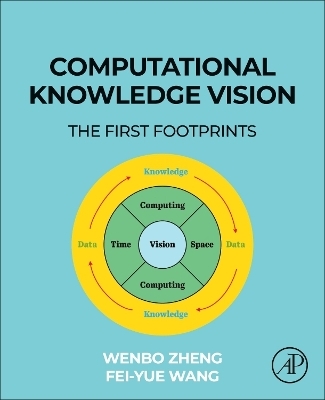
Computational Knowledge Vision
Academic Press Inc (Verlag)
978-0-443-21619-0 (ISBN)
Questions naturally arise in this arena, including (1) How can human knowledge be incorporated with visual models? (2) How does human knowledge promote the performance of visual models? To address these problems, this book proposes a new framework for computer vision–computational knowledge vision.
Wenbo Zheng received his bachelor degree in software engineering from Wuhan University of Technology, Wuhan, China, in 2017. He received his Ph.D. degree in computer science and technology from the Faculty of Electronic and Information Engineering, Xi'an Jiaotong University, Xi'an, China, in 2021. He is currently an Associate Professor at the School of Computer and Artificial Intelligence, Wuhan University of Technology. His research interests include computer vision and machine learning. Fei-Yue Wang received his Ph.D. degree in computer and systems engineering from the Rensselaer Polytechnic Institute, Troy, NY, USA, in 1990. He joined The University of Arizona in 1990 and became a Professor and the Director of the Robotics and Automation Laboratory and the Program in Advanced Research for Complex Systems. In 1999, he founded the Intelligent Control and Systems Engineering Center at the Institute of Automation, Chinese Academy of Sciences (CAS), Beijing, China, and in 2002, was appointed as the Director of the Key Laboratory of Complex Systems and Intelligence Science, CAS. In 2011, he became the State Specially Appointed Expert and the Director of the State Key Laboratory for Management and Control of Complex Systems. He is a FELLOW of IEEE, INCOSE, IFAC, ASME, and AAAS. Since 1997, he has been serving as the General or Program Chair of over 30 IEEE, INFORMS, IFAC, ACM, and ASME conferences. He was the President of the IEEE ITS Society from 2005 to 2007, the Vice President of the ACM China Council from 2010 to 2011, and the Vice President and the Secretary-General of the Chinese Association of Automation from 2008-2018. He was the Founding Editor-in-Chief (EiC) of the International Journal of Intelligent Control and Systems from 1995 to 2000, the IEEE ITS Magazine from 2006 to 2007, the IEEE/CAA JOURNAL OF AUTOMATICA SINICA from 2014-2017. He was the EiC of the IEEE Intelligent Systems from 2009-2012, the IEEE TRANSACTIONS ON Intelligent Transportation Systems from 2009-2016, and is the EiC of the IEEE TRANSACTIONS ON COMPUTATIONAL SOCIAL SYSTEMS from 2017-2020. Currently, he is the President of CAA's Supervision Council, IEEE Council on RFID, and Vice President of IEEE Systems, Man, and Cybernetics Society.
1. Introduction Computational Knowledge Vision Frameworkn
2. Reviewing the Past Enables us to Learnn
3. Computational Knowledge Vision Computational Knowledge Vision Solutionn
4. Low Vision: Computational Knowledge Vision for Edge Detection Modeln
5. Middle Vision: Computational Knowledge Vision for Visual Translation Modeln
6. Middle Vision: Computational Knowledge Vision for Jointly Face Recognitionn
7. High Vision: Computational Knowledge Vision for Visual Reasoning Model Computational Knowledge Vision Applicationn
8. Affective Computing: Computational Knowledge Vision for Depression Detection Modeln
9. Medical Computing: Computational Knowledge Vision for COVID-19 Detection Modeln
10. Medical Computing: Computational Knowledge Vision for Medical Visual Reasoning Model
| Erscheinungsdatum | 03.09.2024 |
|---|---|
| Verlagsort | San Diego |
| Sprache | englisch |
| Maße | 152 x 229 mm |
| Gewicht | 450 g |
| Themenwelt | Informatik ► Theorie / Studium ► Künstliche Intelligenz / Robotik |
| ISBN-10 | 0-443-21619-3 / 0443216193 |
| ISBN-13 | 978-0-443-21619-0 / 9780443216190 |
| Zustand | Neuware |
| Informationen gemäß Produktsicherheitsverordnung (GPSR) | |
| Haben Sie eine Frage zum Produkt? |
aus dem Bereich


